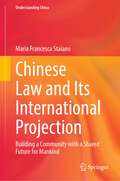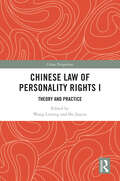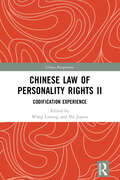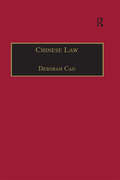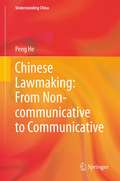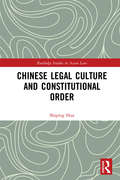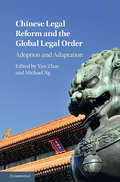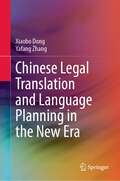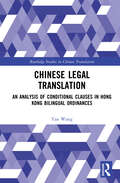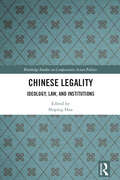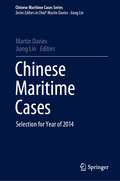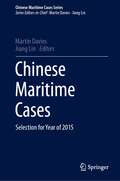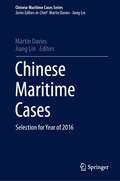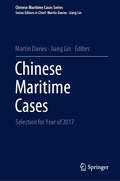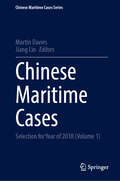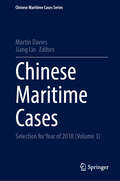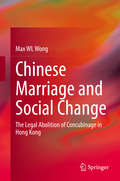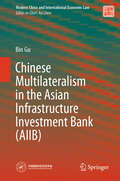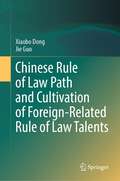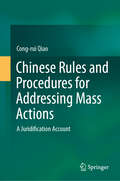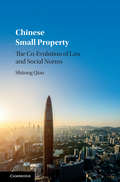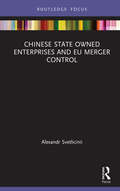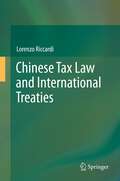- Table View
- List View
Chinese Law and Its International Projection: Building a Community with a Shared Future for Mankind (Understanding China)
by Maria Francesca StaianoThis book aims to explore the construction of Chinese law, with an evolution that has been strongly inspired by international law that has functioned as a "pioneer of legal civilization" in China. Chinese law is a fluid sedimentation of traditional elements of Chinese culture and the internalization of external elements.The internal dimension of Chinese legal evolution therefore coincides with a progressive incursion also at the international level, questioning the traditional rules of international relations. The most relevant and comprehensive concept that has been proposed by China in recent years is certainly the idea of building a "community of shared future for mankind." This aspiration demonstrates a global and integral vocation of international law capable of embracing relations of a new type, towards a multi-polar democratization of international relations, which mark the need for the beginning of a new era.
Chinese Law of Personality Rights I: Theory and Practice (China Perspectives)
by Wang Liming and Shi JiayouThis volume is a collection of up-to-date, authoritative essays on China’s Law of Personality Rights, its impact in practice and its legal background. The Law of Personality Rights was enacted in China in May 2020, the first time that the Law has been legislated as an independent part of the Civil Code of the People's Republic of China, marking an unprecedented step in protecting the personality rights of citizens. As the first volume of a two-volume set that elucidates the theory, practice, and codification experience of the Law in China, the book examines the basis for the Law as a standalone part of the Civil Code, its overall framework and the delimitation and formation of the Law. In terms of practical aspects, the contributors delve into institutional arrangements, the relationship between human rights and personality rights and the relationship with laws on tort liability, as well as those pertaining to marriage and the family. The book will be an essential reference to scholars and students studying civil law, continental law, Chinese law, and the legal protection of personality rights.
Chinese Law of Personality Rights II: Codification Experience (China Perspectives)
by Wang Liming Shi JiayouThis volume is a collection of articles on the codification experience of China’s Law of Personality Rights, explaining the design of the Law as well as its innovations.As the second volume of a two-volume set that elucidates the theory, practice, and codification of the Law in China, the book explains the legal advancement of the Law of Personality Rights as a standalone part of the Civil Code of China. This includes innovative legislative thinking, law system arrangements, rule designs, and a systematic refinement of the provisions of personality rights in terms of nature, system, types, content, exercising rules and protection methods. Regarding the implementation of the Law, the book points out that personality rights are changing with the times so a more complete system of legal interpretation should be built. The final three chapters are appraisals of different versions of the draft law, with amendments to some articles advanced based on shortcomings and omissions.The book will be an essential reference to scholars and students studying civil law, continental law, Chinese law, and the legal protection of personality rights.
Chinese Law: A Language Perspective
by Deborah CaoStudying Chinese law from a linguistic and communicative perspective, this book examines meaning and language in Chinese law. It investigates key notions and concepts of law, the rule of law, and rights and their evolutionary meanings. It examines the linguistic usage and textual features in Chinese legal texts and legal translation, and probes the lawmaking process and the Constitution as speech act and communicative action. Taking a cross-cultural approach, the book applies major Western philosophical thought to Chinese law, in particular the ideas concerning language and communication by such major thinkers as Peirce, Whorf, Gadamer, Habermas, Austin and Searle. The focus of the study is contemporary People's Republic of China; however, the study also traces and links the inherited and introduced cultural and linguistic values and configurations that provide the context in which modern Chinese law operates.
Chinese Lawmaking: From Non-communicative To Communicative (Understanding China)
by Peng HeDr Peng He in her book addresses various issues, drawing on Western and Chinese sources for her argument for a 'communicative' theory of law making. This book is both timely and important in the Chinese context. Her argument depends upon the insight that what is important in societies is not just representative democracy but 'voice' - the opportunity for individuals to be heard and bring their input into official systems. More than that, she argues that this can also take further the idea of living by the rules as something that is not to be seen as narrow Legalism but as something more akin to living 'righteously' - a view which is resonant with parts of Chinese legal thought. This book is also important in the present Chinese context in another way. The developing economy necessitates substantial legal reform. But applying Western models to China can often be naïve and not fully fulfil their intended purpose. Peng He's work addresses this by looking at the process of legislation in connection with legal reform. It is grounded in a sound theoretical reflection of both the process of legal transplantation and the process of law making, and looks both at Western and Chinese sources. Such an approach needs to draw from several intellectual traditions and it is this interdisciplinary, foundational research that is the task Dr He has set herself in her project. Her theory will provide an abstract theoretical framework that is sensitive to local conditions, while at the same time incorporating insights on law reform from a broad range of disciplines. Her research is of direct practical relevance for reforming the legislative process in China. ----Professor Zenon BaÅ,,kowski The University of Edinburgh
Chinese Legal Culture and Constitutional Order (Routledge Studies in Asian Law)
by Shiping HuaThis book examines China’s striving for a constitutional order in the 20th century from comparative, historical, and theoretical perspectives. Through a comprehensive study of six major constitutional reforms experienced by China in the last century, Shiping Hua explores pragmatism, instrumentalism, statism, and favoritism as the key features of the Chinese legal culture. Demonstrating that these characteristics have roots in China’s ancient past and coincide with modern communist legal theory, it argues that Chinese legal culture has greatly impacted upon the country’s move to modernize its legal system. By analyzing key constitutional periods in China’s history, this book also evaluates patterns that can be used to better comprehend not only China’s present legal reform but its future legal developments too. As the first book to examine how the Chinese legal culture has affected constitutional reform in the 20th century, Chinese Legal Culture and Constitutional Order will be useful to students and scholars of Asian and constitutional law, as well as Chinese Studies more generally.
Chinese Legal Reform and the Global Legal Order: Adoption and Adaptation
by Yun Zhao Michael NgThis volume critically evaluates the latest legal reform of China, covering major areas such as trade and securities law, online privacy law, criminal law, human rights and international law. It represents a bold departure from the most recent works on Chinese legal reform by engaging the ideas of experts in contemporary Chinese law with the archival scholarship of Chinese legal historians. This unique interdisciplinary feature affords readers a more nuanced view of the complexities and specificities of how China has problematised legal reforms in various historical contexts when building a progressive yet sustainable legal system. This volume appraises the most current reform in Chinese law by considering China's engagement with globalisation, increasingly complicated domestic situation and historical legal transplantation experiences. It will be of huge interest to students, researchers and practitioners interested in Chinese law and policy, China and Asian studies and Chinese legal history.
Chinese Legal Translation and Language Planning in the New Era
by Xiaobo Dong Yafang ZhangBy making a comprehensive and interdisciplinary analysis on the translation history of both the ancient Chinese legal classics and the modern laws and regulations, this book presents a full picture of development of Chinese legal translation. Legal translation in China has undergone twists and turns in the past and always lacked a systematic and comprehensive theoretical framework. Therefore, guided by the language planning theory, this book intends to build a theoretical framework for study and practices of legal translation in the New Era and provide a feasible path for general readers, students of relevant majors, and professionals interested in Chinese legal culture to get a refreshed understanding legal translation and legal culture promotion.
Chinese Legal Translation: An Analysis of Conditional Clauses in Hong Kong Bilingual Ordinances (Routledge Studies in Chinese Translation)
by Wang YanChinese Legal Translation analyses and investigates the Chinese translation of conditional clauses introduced by various introductory words in Hong Kong bilingual ordinances within the framework of descriptive translation studies and translation typology. This book explores the text typology of Hong Kong bilingual ordinances and highlights differences and similarities between different translations of conditional clauses in the Hong Kong context. Based on both quantitative and qualitative analysis of conditional clauses of the Companies Ordinance, the book summarises the frequency of introductory words of conditional clauses and generalises guiding patterns for writing conditional clauses and translating conditional clauses. The book is significant in providing both theoretical foundations for legal translation and practical guidance for translating legal conditional clauses. This book is primarily targeted for scholars and professionals who are interested in legal writing and legal translation, as well as for students and practitioners in legal translation.
Chinese Legality: Ideology, Law, and Institutions (Routledge Studies on Comparative Asian Politics)
by Shiping HuaChinese Legality focuses on the concept of "legality" as a lens through which to look at Chinese legal reforms, making a valuable contribution to the argument that law has historically been used as a tool to control society in China. This book discusses how Chinese legality in the Xi Jinping era is defined from a theoretical, ideological, historical, and cultural point of view. Covering vitally important events such as Xi’s term limit issue, the Hong Kong protests and the Covid-19 pandemic, the book examines how legality is reflected and embodied in laws and constitutions, and how legality is realized through institutions, with particular focus on how the CCP interacts with the legislature, the judiciary, the procuratorate, and the police. As a study of the legal reforms under Xi Jinping, this book will be of interest to students and scholars of Chinese politics and law.
Chinese Maritime Cases: Selection for Year of 2014 (Chinese Maritime Cases Series)
by Martin Davies Jiang LinThis book selects leading, innovative and influential Chinese maritime judgments and presents full translation of them, with brief summary, to the readers so that they can have insights of how the Chinese maritime judges interpret, apply and develop Chinese maritime law in practice. China trades with other states in trillions of USD every year, and about 95% of the cargoes are carried by ocean-going ships calling at hundreds of Chinese ports each single day. Due to the enormous and steadily growing trade volume and shipping activities, foreign ships, companies and persons are often caught by the Chinese maritime law and court. The parties involved and their lawyers are more than ever enthusiastic to study Chinese maritime cases in order to deal with their own cases properly or, if possible, predict the potential problems and avoid the disputes outright. The book is appealing to and benefits worldwide law students, academics, practitioners and industrial people in the shipping, trade, insurance and financial fields. The book remedies to certain extent the situation that there is lack of authoritative sources available to foreign personnel to look into how Chinese justice system functions.
Chinese Maritime Cases: Selection for Year of 2015 (Chinese Maritime Cases Series)
by Martin Davies Jiang LinThis book selects leading, innovative and influential Chinese maritime judgments and presents full translation of them, with brief summary, to the readers so that they can have insights of how the Chinese maritime judges interpret, apply and develop Chinese maritime law in practice. China trades with other states in trillions of USD every year, and about 95% of the cargoes are carried by ocean-going ships calling at hundreds of Chinese ports each single day. Due to the enormous and steadily growing trade volume and shipping activities, foreign ships, companies and persons are often caught by the Chinese maritime law and court. The parties involved and their lawyers are more than ever enthusiastic to study Chinese maritime cases in order to deal with their own cases properly or, if possible, predict the potential problems and avoid the disputes outright. The book is appealing to and benefits worldwide law students, academics, practitioners and industrial people in the shipping, trade, insurance and financial fields. The book remedies to certain extent the situation that there is lack of authoritative sources available to foreign personnel to look into how Chinese justice system functions.
Chinese Maritime Cases: Selection for Year of 2016 (Chinese Maritime Cases Series)
by Martin Davies Jiang LinThis book selects leading, innovative and influential Chinese maritime judgments and presents full translation of them, with brief summary, to the readers so that they can have insights of how the Chinese maritime judges interpret, apply and develop Chinese maritime law in practice. China trades with other states in trillions of USD every year, and about 95% of the cargoes are carried by ocean-going ships calling at hundreds of Chinese ports each single day. Due to the enormous and steadily growing trade volume and shipping activities, foreign ships, companies and persons are often caught by the Chinese maritime law and court. The parties involved and their lawyers are more than ever enthusiastic to study Chinese maritime cases in order to deal with their own cases properly or, if possible, predict the potential problems and avoid the disputes outright. The book is appealing to and benefits worldwide law students, academics, practitioners and industrial people in the shipping, trade, insurance and financial fields. The book remedies to certain extent the situation that there is lack of authoritative sources available to foreign personnel to look into how Chinese justice system functions.
Chinese Maritime Cases: Selection for Year of 2017 (Chinese Maritime Cases Series)
by Martin Davies Jiang LinThis book selects leading, innovative and influential Chinese maritime judgments and presents full translation of them, with brief summary, to the readers so that they can have insights of how the Chinese maritime judges interpret, apply and develop Chinese maritime law in practice. China trades with other states in trillions of USD every year, and about 95% of the cargoes are carried by ocean-going ships calling at hundreds of Chinese ports each single day. Due to the enormous and steadily growing trade volume and shipping activities, foreign ships, companies and persons are often caught by the Chinese maritime law and court. The parties involved and their lawyers are more than ever enthusiastic to study Chinese maritime cases in order to deal with their own cases properly or, if possible, predicate the potential problems and avoid the disputes outright. The book is appealing to and benefits worldwide law students, academics, practitioners and industrial people in the shipping, trade, insurance and financial fields. The book remedies to certain extent the situation that there is lack of authoritative sources available to foreign personnel to look into how Chinese justice system functions.
Chinese Maritime Cases: Selection for Year of 2018 (Volume 1) (Chinese Maritime Cases Series)
by Martin Davies Jiang LinChina (the Mainland of PRC) trades with other states in trillions of USD every year, and about 95% of the cargoes are carried by ocean-going ships calling at hundreds of Chinese ports each singe day. Due to the enormous trade volume and shipping activities, foreign ships, companies and professionals are often caught in the Chinese maritime law and court. The foreign parties involved in Chinese litigation or dispute resolution and their lawyers are more and more enthusiastic to study Chinese maritime cases in order to deal with their own cases properly or, if possible, predicate the potential risks and avoid the disputes outright. However, to date, no Chinese series casebook has ever been published. Now, for the first time, the authors offer this series casebook of delicately selected Chinese maritime judgments. Each year, the book selects a number of leading, innovative and influential Chinese maritime judgments and presents full English translation of them, together with summary, to the readers so that they can have insights of how the Chinese maritime judges interpret, apply and develop Chinese maritime law in practice. The book will benefit the worldwide students, academics, practitioners and industrial people who may be engaged in international trade, shipping, insurance and other transactions concerning China. The book will also indemnify to certain extent the situation that there is lack of authoritative sources available to foreign personnel to look into how Chinese justice system functions and grows in real life.
Chinese Maritime Cases: Selection for Year of 2018 (Volume 2) (Chinese Maritime Cases Series)
by Martin Davies Jiang LinChina (the Mainland of PRC) trades with other states in trillions of USD every year, and about 95% of the cargoes are carried by ocean-going ships calling at hundreds of Chinese ports each singe day. Due to the enormous trade volume and shipping activities, foreign ships, companies and professionals are often caught in the Chinese maritime law and court. The foreign parties involved in Chinese litigation or dispute resolution and their lawyers are more and more enthusiastic to study Chinese maritime cases in order to deal with their own cases properly or, if possible, predicate the potential risks and avoid the disputes outright. However, to date, no Chinese series casebook has ever been published. Now, for the first time, the authors offer this series casebook of delicately selected Chinese maritime judgments. Each year, the book selects a number of leading, innovative and influential Chinese maritime judgments and presents full English translation of them, together with summary, to the readers so that they can have insights of how the Chinese maritime judges interpret, apply and develop Chinese maritime law in practice. The book will benefit the worldwide students, academics, practitioners and industrial people who may be engaged in international trade, shipping, insurance and other transactions concerning China. The book will also indemnify to certain extent the situation that there is lack of authoritative sources available to foreign personnel to look into how Chinese justice system functions and grows in real life.
Chinese Maritime Cases: Selection for Year of 2018 (Volume 3) (Chinese Maritime Cases Series)
by Martin Davies Jiang LinChina (the Mainland of PRC) trades with other states in trillions of USD every year, and about 95% of the cargoes are carried by ocean-going ships calling at hundreds of Chinese ports each singe day. Due to the enormous trade volume and shipping activities, foreign ships, companies and professionals are often caught in the Chinese maritime law and court. The foreign parties involved in Chinese litigation or dispute resolution and their lawyers are more and more enthusiastic to study Chinese maritime cases in order to deal with their own cases properly or, if possible, predicate the potential risks and avoid the disputes outright. However, to date, no Chinese series casebook has ever been published. Now, for the first time, the authors offer this series casebook of delicately selected Chinese maritime judgments. Each year, the book selects a number of leading, innovative and influential Chinese maritime judgments and presents full English translation of them, together with summary, to the readers so that they can have insights of how the Chinese maritime judges interpret, apply and develop Chinese maritime law in practice. The book will benefit the worldwide students, academics, practitioners and industrial people who may be engaged in international trade, shipping, insurance and other transactions concerning China. The book will also indemnify to certain extent the situation that there is lack of authoritative sources available to foreign personnel to look into how Chinese justice system functions and grows in real life.
Chinese Marriage and Social Change: The Legal Abolition of Concubinage in Hong Kong
by Max WL WongThis book provides a comparative account of the abolition of concubinage in East Asia, offering a new perspective and revised analysis of the factors leading to – and the debates surrounding – the introduction of a new Marriage Reform Ordinance in Hong Kong in 1971. It uses this law as a platform to examine how the existence of concubinage – long preserved in the name of protecting Chinese traditions and customs — crucially influenced family law reforms, which were in response to a perceived need to create a ‘modern’ marriage system within Hong Kong’s Chinese community after the Second World War. This was, by and large, the result of continued pressure from within Hong Kong and from Britain to bring Hong Kong’s marriage system in line with international marriage treaties. It represented one of the last significant intrusions of colonial law into the private sphere of Hong Kong social life, eliminating Chinese customs which had been previously recognised by the colonial legal system’s family law. This book contextualizes the Hong Kong situation by examining judicial cases interpreting Chinese customs and the Great Qing Code, offering a comprehensive understanding of the Hong Kong situation in relation to the status of concubines in Republican China and other East Asian jurisdictions. It will be of particular interest to teachers and students of law, as well as researchers in gender studies, post-colonialism, sociology and cultural studies.
Chinese Multilateralism in the Asian Infrastructure Investment Bank (Modern China and International Economic Law)
by Bin GuThis book reflects the latest legal development of the Asian Infrastructure Investment Bank (AIIB), and makes direct and positive responses—it uses first-hand, authoritative information and makes insightful and persuasive analyses in addressing those concerns.In particular, this book provides nuanced analysis of the following topics:— capital allocation of the AIIB, in comparison with those of Bretton Woods institutions;— dynamic relationship between the shareholder board and management, a central topic of corporate governance for the AIIB and other MDBs;— AIIB’s environmental and social safeguards, including its frontier ESG portfolio investments, in comparison with the World Bank standards;— highly debatable issues relating to the interaction between AIIB, Belt and Road, and MCDF;— comparative study of state-owned enterprises in the laws of AIIB, WTO, ICSID, etc..This book targets academics, students, policymakers, and businesscircles who are interested in AIIB, given the bank’s growing importance in the context of global economic governance reforms. First, the book is a must for those who are keen to gain insight into the AIIB. Ten years have passed since the debut of the idea of AIIB in 2013, and the topic has never retreated from the debate of the international community—a major concern is whether a China-led multilateral development bank (MDB) remains to be politically neutral, or professional, and can live up to high standards.
Chinese Rule of Law Path and Cultivation of Foreign-Related Rule of Law Talents
by Jie Guo Xiaobo DongThis book systematically explores the historical development, connotation, characteristics and cultural resources of Chinese rule of law path based on the combination theory and practice. It also comprehensively reveals the overall objectives and promotion models of Chinese rule of law path, theoretically expounds the people-oriented nature of Chinese Thought on the Rule of Law and the global initiatives of Chinese rule of law path, and proposes the important guarantee of realizing the global initiatives of Chinese rule of law path——the cultivation of foreign-related rule of law talents. From this book, readers, not only scholars and experts specialized in relevant fields but also layman interested in legal life of modern China, can truly grasp the rich connotation of the socialist rule of law with Chinese characteristics in the new era and have a refreshing understanding of contemporary legal culture of China.
Chinese Rules and Procedures for Addressing Mass Actions: A Juridification Account
by Cong-rui QiaoThis book unravels the intricate tapestry of Chinese state-society and government-citizen interactions in both legal historical and contemporary contexts. Set against the backdrop of China’s meteoric rise as a global economic and political powerhouse, it presents a comprehensive and nuanced exploration of China’s governance norms and their transformative evolution in the modern and contemporary eras. The book analyses China’s multifaceted governance landscape, including its profound influence on the dynamics of government-citizen interactions in contemporary China. By introducing the concept of “juridification”, it demystifies the complexities of Chinese governance traditions and transitions. At its core, the book reveals how legislative, administrative and judicial authorities address the collective grievances of Chinese citizens. Through a combination of historical, legal and sociological analyses, it equips readers with an understanding of the formal and practical mechanisms used by Chinese authorities, spanning from the 1980s to the present, to address mass actions. In addition, the book assesses an underexplored aspect: the changing narratives and diverse perspectives found in news coverage of government responses to mass actions, shedding light on the socialisation of principles of public accountability and the safeguarding of civil rights in China. The book is intended to make the topic accessible to both scholars and an interested global audience, helping them understand the Chinese legal governance model, its underlying rationale, recent developments and social implications.
Chinese Small Property: The Co-Evolution of Law and Social Norms
by Shitong QiaoSmall property houses provide living space to about eight million migrant workers, office space for start-ups, grassroots police stations and public schools; their contribution to the economic growth and urbanization of a city is immense. The interaction between the small property sector and the formal legal order has a long history and small property has become an established engine of social and legal change. Chinese Small Property presents vivid stories about how institutional entrepreneurs worked together to create an impersonal market outside of the formal legal system to support millions of transactions. Qiao uses an eleven-month fieldwork project in Shenzhen - China's first special economic zone that has grown to a mega city with over fifteen million people - to demonstrate this. A thorough and detailed investigation into small property rights in China, Chinese Small Property is an invaluable source of new information for students and scholars of the field.
Chinese State Owned Enterprises and EU Merger Control
by Alexandr SvetliciniiThis book analyzes the specifics of corporate governance of China’s State Owned Enterprises (SOEs) and their assessment under EU merger control, which is reflected in the EU Commission’s screening of the notified economic concentrations. Guided by the going global policy and the Belt and Road Initiative, Chinese SOEs have expanded their global presence considerably. Driven by the need to acquire cutting edge technologies and other industrial policy considerations, Chinese SOEs have engaged in a series of corporate acquisitions in Europe. The main objective of this book is to demonstrate the conceptual and regulatory challenges of applying traditional merger assessment tools in cases involving Chinese SOEs due to the specifics in their corporate governance and the regulatory framework under which they operate in China. The book also explores the connection between the challenges experienced by the merger control regimes in the EU and the recent introduction of the EU foreign direct investment screening framework followed by a proposal concerning foreign subsidies. The book will be a useful guide for academics and researchers in the fields of law, international relations, political science, and political economy; legal practitioners dealing with cross-border mergers and acquisitions; national competition authorities and other public bodies carrying out merger control; policy makers, government officials, and diplomats in China and the EU engaged in bilateral economic relations.
Chinese Strategic Decision-making on CSR (CSR, Sustainability, Ethics & Governance)
by Shuo WangThis research study attempts to provide a comprehensive CSR literature review, analyze corporate social responsibility (CSR) issues from the strategic decision-making (SDM) perspective, and investigate the process of managers' CSR- related SDM in China. In particular, it utilizes content analysis to examine selected CSR articles from published studies, in order to evaluate the trends in CSR theory development as well as to identify the variables, constructs, and relationships within CSR theory. The review indicates that CSR should be involved in organizational strategies. Therefore, this study reviews the relevant theoretical and empirical literature in the SDM area. Firstly, it summarizes the broader context of strategic decisions and points out factors in the external environment and organizational characteristics that influence the SDM process of managers. Secondly, it articulates the influences of individual characteristics on the SDM. Thirdly, it examines the process of SDM using the rational and bounded rationality theory of decision making. Finally, on the basis of the SDM model, the author generates a research model which proposes the links between vital and influential factors from an integrated perspective. This book also provides a detailed description of how to choose a proper method for the CSR-related SDM research, the process of survey design, sampling methods, and survey administration. In particular, the author utilized a policy-capturing method to develop a series of scenarios concerning CSR activities and an explanation of this method is provided. It reports research findings of this study and provides an extensive and thorough discussion and compares it with previous empirical studies. The conclusion summarizes the research findings and their theoretical and practical implications.
Chinese Tax Law and International Treaties
by Lorenzo RiccardiThe People's Republic of China's tax policies and international obligations are as multifaceted and dynamic as they are complex, developing closely with the nation's rise to the world's fastest-growing major economy. Today, after decades of reform and the entry into the World Trade Organization, China has developed regulatory systems that enable it to provide stable administration, including a tax structure. China's main tax reform can be attributed to the enactment of the Enterprise Income Tax Law, which came into effect on January 1, 2008. Chinese tax regulations include direct taxes, indirect taxes, other taxes, and custom duties and from a collection point of view, China's tax administration adopts a very devolved system, with revenue collected and shared between different levels of government in accordance with contracts between the different levels of the tax administration system. With respect to international treaties, China has established a network of bilateral tax treaties and regional free trade agreements. This publication describes in detail China's complex tax system and policies, as well as major bilateral treaties in which China has entered into using country-by-country analysis. Lorenzo Riccardi is Tax Advisor and Certified Public Accountant specialized in international taxation. He is based in Shanghai, where he focuses on business and tax law, assisting foreign investments in East Asia. He is an auditor and an advisor for several corporate groups and he is partner and Head of Tax of the consulting firm GWA, specializing in emerging markets.
